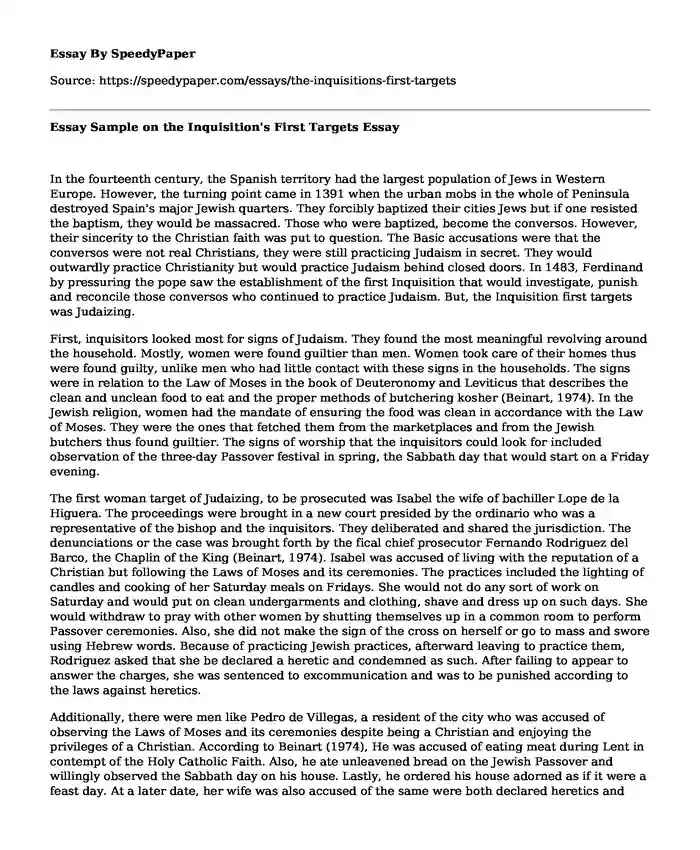In the fourteenth century, the Spanish territory had the largest population of Jews in Western Europe. However, the turning point came in 1391 when the urban mobs in the whole of Peninsula destroyed Spain's major Jewish quarters. They forcibly baptized their cities Jews but if one resisted the baptism, they would be massacred. Those who were baptized, become the conversos. However, their sincerity to the Christian faith was put to question. The Basic accusations were that the conversos were not real Christians, they were still practicing Judaism in secret. They would outwardly practice Christianity but would practice Judaism behind closed doors. In 1483, Ferdinand by pressuring the pope saw the establishment of the first Inquisition that would investigate, punish and reconcile those conversos who continued to practice Judaism. But, the Inquisition first targets was Judaizing.
First, inquisitors looked most for signs of Judaism. They found the most meaningful revolving around the household. Mostly, women were found guiltier than men. Women took care of their homes thus were found guilty, unlike men who had little contact with these signs in the households. The signs were in relation to the Law of Moses in the book of Deuteronomy and Leviticus that describes the clean and unclean food to eat and the proper methods of butchering kosher (Beinart, 1974). In the Jewish religion, women had the mandate of ensuring the food was clean in accordance with the Law of Moses. They were the ones that fetched them from the marketplaces and from the Jewish butchers thus found guiltier. The signs of worship that the inquisitors could look for included observation of the three-day Passover festival in spring, the Sabbath day that would start on a Friday evening.
The first woman target of Judaizing, to be prosecuted was Isabel the wife of bachiller Lope de la Higuera. The proceedings were brought in a new court presided by the ordinario who was a representative of the bishop and the inquisitors. They deliberated and shared the jurisdiction. The denunciations or the case was brought forth by the fical chief prosecutor Fernando Rodriguez del Barco, the Chaplin of the King (Beinart, 1974). Isabel was accused of living with the reputation of a Christian but following the Laws of Moses and its ceremonies. The practices included the lighting of candles and cooking of her Saturday meals on Fridays. She would not do any sort of work on Saturday and would put on clean undergarments and clothing, shave and dress up on such days. She would withdraw to pray with other women by shutting themselves up in a common room to perform Passover ceremonies. Also, she did not make the sign of the cross on herself or go to mass and swore using Hebrew words. Because of practicing Jewish practices, afterward leaving to practice them, Rodriguez asked that she be declared a heretic and condemned as such. After failing to appear to answer the charges, she was sentenced to excommunication and was to be punished according to the laws against heretics.
Additionally, there were men like Pedro de Villegas, a resident of the city who was accused of observing the Laws of Moses and its ceremonies despite being a Christian and enjoying the privileges of a Christian. According to Beinart (1974), He was accused of eating meat during Lent in contempt of the Holy Catholic Faith. Also, he ate unleavened bread on the Jewish Passover and willingly observed the Sabbath day on his house. Lastly, he ordered his house adorned as if it were a feast day. At a later date, her wife was also accused of the same were both declared heretics and Judaizers and were relaxed to the secular arm. The Prosecutor could add new charges with ant new information brought against a defendant.
The reading plays a vital role in understanding the extent to which Christians would go to maintain their faith. According to Christian, the conversos were supposed to have given up on their Jewish practices and become full Christians. This was an orthodoxy way of ensuring that the conversos maintained their faith. Thus, this reading ensures that we understand the establishment of the catholic faith in Spain and the measures taken to ensure that the faith was kept to the fullest. Also, by studying the trials, there is a clear understanding of the many accusations brought against the accused and the punishment they got. Therefore, it fits in the clear understanding of the religious history in Spain.
In conclusion, the establishment of the Inquisition was important at that specific time because it ensured that it maintained the newly established Christians faith for the converted Jews in those cities. By doing so, that they would ensure that their faith was the only one practiced and the Jewish religion is completely forgotten. Privileges such as positions in high offices were meant for Christians which meant that if one wanted to enjoy such privileges, he or she had to be a Christian.
Reference
Beinart, H. (1974). Records of the Trials of the Spanish Inquisition. The Jewish Quarterly Review, 70(2), 119. doi: 10.2307/1453871
Cite this page
Essay Sample on the Inquisition's First Targets. (2019, Oct 18). Retrieved from https://speedypaper.com/essays/the-inquisitions-first-targets
Request Removal
If you are the original author of this essay and no longer wish to have it published on the SpeedyPaper website, please click below to request its removal:
- Free Essay Example on FIFA Corruption
- Free Essay on Aboriginal Protection Board as a Form of Dispossession
- Computer Vs Information Literacy in Healthcare, Essay Example
- Free Essay Example on Water Stations
- Essay Sample on The Home Box Office
- Free Essay - Elvis Presley's Letter to Richard Nixon
- Paper Example: Personal Craziness Index (PCI)
Popular categories





